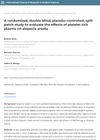 August 2024 in “Frontiers in Public Health”
August 2024 in “Frontiers in Public Health” Alopecia Areata severely impacts mental health, causing anxiety and depression, affecting quality of life.
 March 2023 in “Photodiagnosis and Photodynamic Therapy”
March 2023 in “Photodiagnosis and Photodynamic Therapy” Low vitamin D levels are linked to severe and active alopecia areata.
[object Object] 20 citations,
January 2019 in “International journal of trichology” People with Alopecia areata often have lower Vitamin D levels, which might affect the severity of their condition.
 2 citations,
June 2023 in “Skin Research and Technology”
2 citations,
June 2023 in “Skin Research and Technology” Yellow dots and short vellus hairs are the most common signs of Alopecia Areata (AA), and trichoscopy can help diagnose AA and track treatment progress.
 January 2023 in “Indian Dermatology Online Journal”
January 2023 in “Indian Dermatology Online Journal” Bimatoprost and clobetasol are both effective for scalp hair loss, but bimatoprost works faster, has fewer side effects, and grows more colored hair.
 July 2018 in “International Journal of Research in Medical Sciences”
July 2018 in “International Journal of Research in Medical Sciences” Platelet rich plasma was slightly more effective than no treatment for hair loss in alopecia areata patients.
 74 citations,
April 2005 in “Dermatologic Clinics”
74 citations,
April 2005 in “Dermatologic Clinics” Minoxidil and finasteride are effective for male hair loss, minoxidil for female hair loss, and various treatments like corticosteroids work for alopecia areata; treatment should be tailored to the individual.
 69 citations,
April 2017 in “BMJ open”
69 citations,
April 2017 in “BMJ open” Many people with alopecia experience high levels of social anxiety, anxiety, and depression, and while wigs can boost confidence, they may also cause anxiety.
 58 citations,
January 2018 in “International Journal of Women's Dermatology”
58 citations,
January 2018 in “International Journal of Women's Dermatology” Alopecia significantly lowers women's quality of life, with psychological and social challenges, highlighting the importance of early treatment and support.
 32 citations,
January 2019 in “American Journal of Clinical Dermatology”
32 citations,
January 2019 in “American Journal of Clinical Dermatology” Minoxidil helps treat eyebrow thinning, monilethrix, early hair loss, and shortens chemo-related hair loss.
23 citations,
February 2021 in “Dermatologic therapy” Some treatments like pentoxifylline with topical corticosteroids might work for alopecia areata, but more research is needed to find the best one.
19 citations,
July 2020 in “EBioMedicine” A gene variant increases the risk of a type of hair loss by affecting hair protein production.
 15 citations,
November 2015 in “Journal of Dermatology and Dermatologic Surgery”
15 citations,
November 2015 in “Journal of Dermatology and Dermatologic Surgery” Mixing platelet-rich plasma with triamcinolone acetonide can potentially improve hair regrowth in alopecia areata patients.
 4 citations,
January 2023 in “Skin health and disease”
4 citations,
January 2023 in “Skin health and disease” Blocking Janus kinase 1 helps stop inflammation and regrow hair, making it a good treatment for hair loss from alopecia areata.
 4 citations,
November 2022 in “Frontiers in Medicine”
4 citations,
November 2022 in “Frontiers in Medicine” People with alopecia areata are more likely to have anxiety and depression and a lower quality of life.
 4 citations,
September 2022 in “Dermatologic Therapy”
4 citations,
September 2022 in “Dermatologic Therapy” Baricitinib helped some patients with tough-to-treat hair loss regrow hair, but more research is needed on its safety.
 4 citations,
November 2021 in “Journal of Clinical Medicine”
4 citations,
November 2021 in “Journal of Clinical Medicine” Higher levels of CCL7 are linked to more severe hair loss in alopecia areata patients.
 3 citations,
July 2022 in “Indian journal of dermatology, venereology, and leprology”
3 citations,
July 2022 in “Indian journal of dermatology, venereology, and leprology” Patients with alopecia areata have higher oxidative stress and lower antioxidant levels.
 3 citations,
April 2019 in “Journal of Dermatological Treatment”
3 citations,
April 2019 in “Journal of Dermatological Treatment” Caffeine shows promise for treating some types of hair loss, but more research is needed.
 3 citations,
January 2018 in “İstanbul Kuzey Klinikleri”
3 citations,
January 2018 in “İstanbul Kuzey Klinikleri” Hair loss was found in 37.4% of surveyed rural high-school students in Eskisehir, Turkey, affecting their quality of life, especially in general health and mental well-being.
 3 citations,
June 2006 in “Expert Review of Dermatology”
3 citations,
June 2006 in “Expert Review of Dermatology” The document concludes that hair loss is complex, affects many people, has limited treatments, and requires more research on its causes and psychological impact.
 1 citations,
April 2020 in “Plastic and Aesthetic Nursing”
1 citations,
April 2020 in “Plastic and Aesthetic Nursing” PRP therapy might help increase hair growth for nonscarring alopecia, but more research is needed to confirm its effectiveness.
[object Object] 1 citations,
December 2023 in “International journal of molecular sciences” miR-199a-3p controls hair growth and is linked to alopecia areata.
 March 2024 in “International Journal of Dermatology”
March 2024 in “International Journal of Dermatology” Baricitinib improved nail condition and hair regrowth in a patient with alopecia and nail abnormalities.
 February 2024 in “The Open dermatology journal”
February 2024 in “The Open dermatology journal” Alopecia Areata affects people of all ages worldwide, is likely caused by genetic and environmental factors, and can lead to stress and depression, highlighting the need for treatments that address both physical and mental health.
 October 2023 in “The Cochrane library”
October 2023 in “The Cochrane library” The medicine baricitinib was found to notably improve hair regrowth in alopecia areata, but more research is needed on its side effects and other treatments.
 September 2023 in “Journal of Cosmetic Dermatology”
September 2023 in “Journal of Cosmetic Dermatology” Lower vitamin D levels are linked to higher CRP levels in people with a type of hair loss called alopecia areata.
 July 2023 in “IntechOpen eBooks”
July 2023 in “IntechOpen eBooks” New treatments for alopecia areata show promise, but more research is needed to confirm their effectiveness.
 July 2023 in “Clinical dermatology review”
July 2023 in “Clinical dermatology review” Intralesional triamcinolone acetonide is better than PRP for treating scalp alopecia areata, leading to faster and more complete hair regrowth.
 July 2023 in “Health science reports”
July 2023 in “Health science reports” Alopecia Areata is linked to a higher risk of several diseases, which vary with age and sex.


























